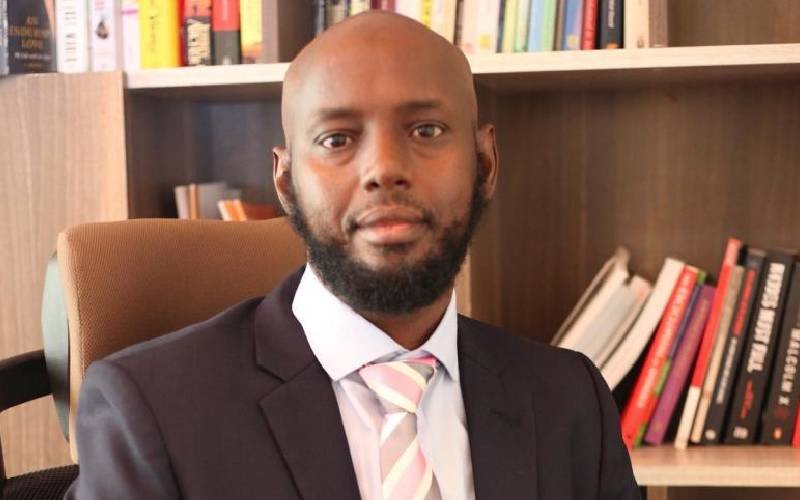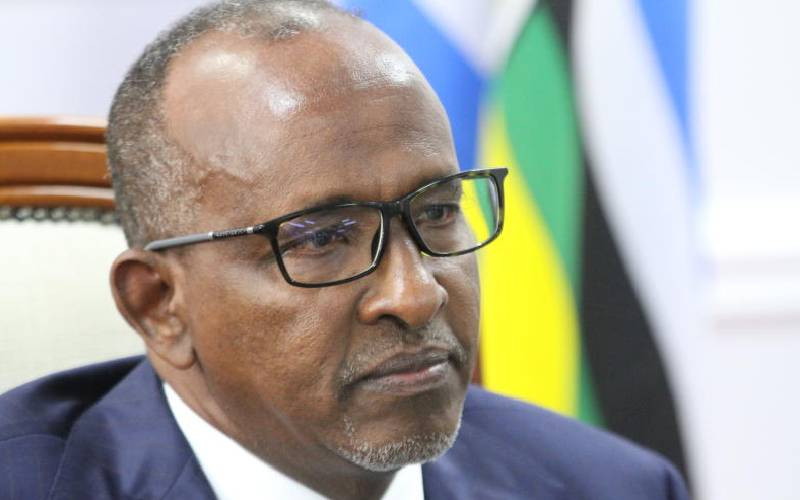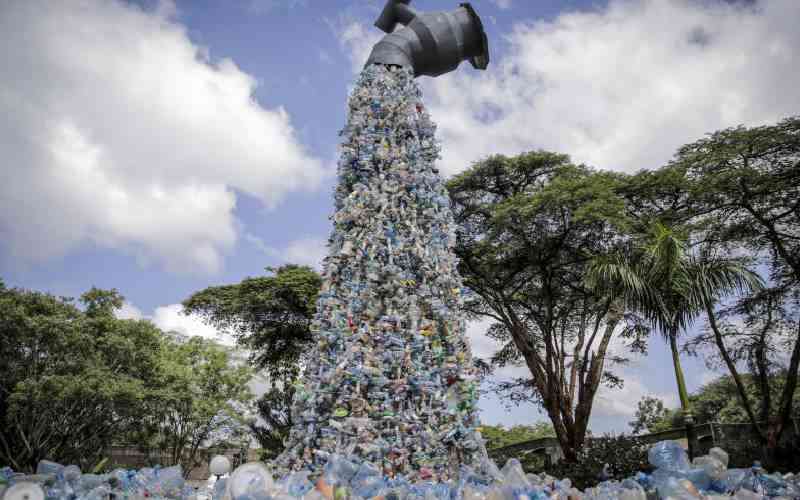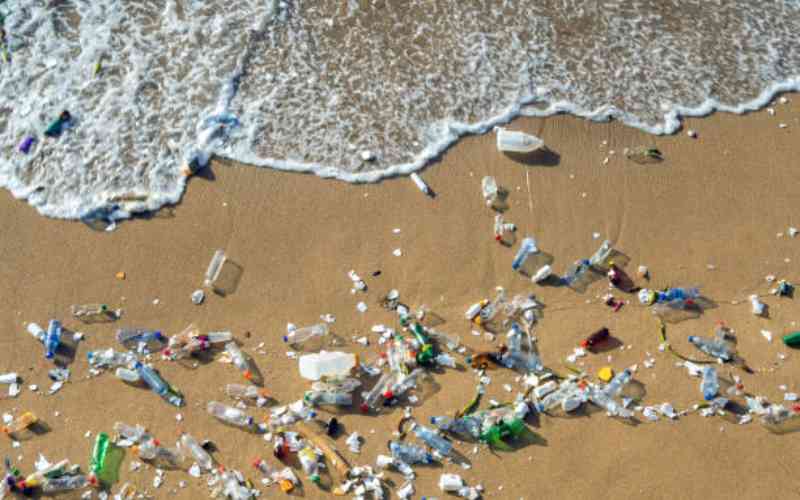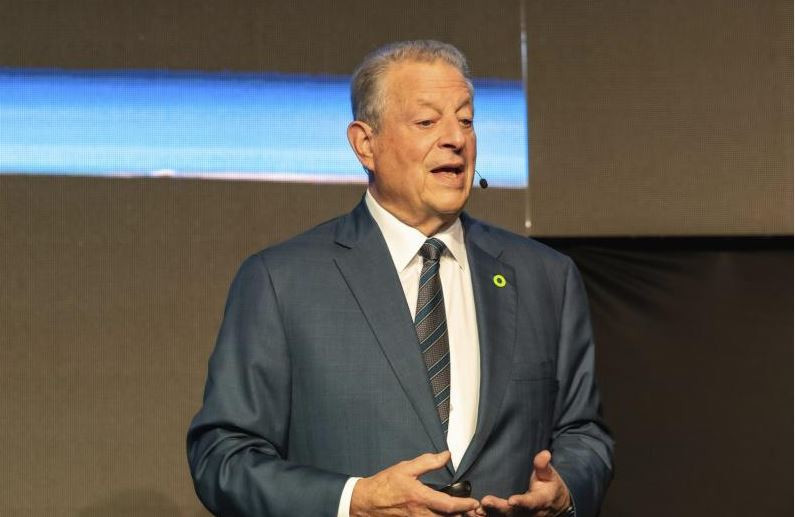
Former U.S. Vice President Al Gore delivered a stark warning at the TED Countdown Summit in Nairobi: Kenya is already home to 800,000 climate refugees.
Speaking to a global audience gathered in the Kenyan capital, Gore painted a data-rich picture of a climate crisis that is not looming, it is happening now, and Africa is on the frontline.
“We have 800,000 climate refugees already here in Kenya. That’s not a future projection. That’s now,” he declared.
Gore pointed to the Horn of Africa’s record-breaking drought, lasting over four years, devastating farms and livestock and forcing families from their homes. In other parts of Kenya, such as Budalangi and Garissa, unpredictable rainfall and flooding have destroyed homes and livelihoods, further driving displacement.
His appearance came at a pivotal moment for the TED Summit, themed around accelerating climate solutions. The event, hosted in Africa for the first time, convened policymakers, innovators, and activists worldwide. Gore did not mince his words.
“The climate crisis is not a distant threat. It is a present emergency, especially in the Global South,” he stated firmly.
He linked local displacement trends in Kenya to broader failures in climate justice. Africa contributes roughly four per cent of global greenhouse gas emissions yet suffers disproportionately from the impacts of climate change.
Using satellite data, Gore highlighted intensifying heatwaves and droughts across sub-Saharan Africa. According to National Aeronautics and Space Administration (NASA) and National Oceanic and Atmospheric Administration (NOAA), the previous year was the hottest ever recorded globally. These soaring temperatures hit African farmers hardest, many dependent on rain-fed agriculture.
- Climate: Experts call on countries to invest in early warning signs
- Religious leaders call for inclusive climate action, scaling up of adaptation efforts
Keep Reading
“Every missed rainfall pushes families closer to migration. When the rain disappears, so does the future for millions of farmers,” Gore warned.
He emphasised that the 800,000 climate refugees in Kenya are only the beginning. The United Nations projects that by 2050, more than 1.2 billion people worldwide could be displaced due to climate factors, with Africa among the hardest-hit regions.
Gore sharply criticised fossil fuel companies, accusing them of obstructing progress.
“The oil and gas companies are not only polluting our skies, they’re also polluting our politics,” he said, blaming them for delaying the clean energy transition through lobbying and misinformation.
He highlighted that just 20 fossil fuel firms have been responsible for a third of all emissions since 1965. Their ongoing expansion into Africa—especially in East Africa’s gas exploration, undermines the continent’s potential to lead in renewable energy.
Instead, Gore praised African climate leadership.
He noted Kenya’s pioneering role in geothermal energy and solar power. Today, Kenya generates over 80 per cent of its electricity from renewables. Gore lauded local innovations, such as community-based solar microgrids in Turkana and mobile technology for climate adaptation.
“Africa has the potential to leapfrog dirty energy entirely. But it needs financing and political will,” he insisted.
Financing was a key theme throughout his speech. Gore demanded wealthy countries deliver the US$100 billion climate finance pledged annually under the Paris Agreement. This funding is vital for adaptation, especially in frontline nations like Kenya. However, a recent Oxfam report reveals only a small fraction of this money reaches local communities.
He criticised the structure of climate finance, much of which is given as loans rather than grants, pushing vulnerable countries deeper into poverty.
“Why should the victims be forced to pay for the crimes of polluters?” he asked.
Gore also called for reform of global financial institutions like the World Bank and IMF, which he claimed have failed to support climate-vulnerable nations with sufficient urgency.
Reflecting on the ten-year anniversary of the Paris Agreement, Gore reminded the audience that 195 nations pledged to reach net-zero emissions by mid-century. But he addressed the elephant in the room: the United States’ withdrawal under the Trump administration.
“The Donald Trump administration has cancelled executive orders, withdrawn from international climate organisations, and declared a so-called energy emergency to promote fossil fuels,” he said.
Gore paused before offering a grim assessment: “There’s good news and there’s bad news. A lot has happened.”
He shifted to the fossil fuel industry’s pushback, noting executives branded the Paris commitments unrealistic. They promoted “climate realism,” prioritising adaptation over emission cuts and allowing continued pollution.
“Fossil fuel companies want to funnel aid into fossil-fuel infrastructure under the guise of expanding energy access in developing countries,” he explained.
Broadening the perspective, Gore warned that whole regions are becoming uninsurable due to climate risks. In the United States, insurers are withdrawing coverage in high-risk areas.
Economists predict losses of US$25 trillion in global housing value over 25 years and US$178 trillion over 50 years if no action is taken. However, a Deloitte study shows that tackling emissions could add US$43 trillion to the global economy.
Gore turned to the Arctic, emphasising accelerating ice melt. “Greenland is losing 30 million tonnes of ice every hour. In Antarctica, ice loss has doubled in the last 20 years. Sea-level rise is accelerating.”
He also highlighted health impacts, citing the WHO’s warning that climate change is “the most serious health threat facing humanity.” A recent University of Manchester study predicts rising temperatures and rainfall changes will enable fungal infections to spread widely—a scenario “that is not science fiction.”
The oceans, Gore said, are suffering too. “They are 30 per cent more acidic than pre-industrial times. Ninety-three per cent of global heat ends up in oceans. Coral reefs, 84 per cent, are in danger. Forty to sixty per cent of fish species face high risk. Estuaries are heating up, and half of all living species could be extinct this century.”
Freshwater supplies are under threat. “Glacial meltwater supports a quarter of the world’s population. Himalayan glaciers are already 40 per cent affected by water scarcity. Depending on action, 80 per cent could disappear this century.”
He referenced a recent glacial avalanche in Switzerland that destroyed a 600-year-old village, and how locals covered ice fields with white sheets in a desperate attempt to slow melting.
Food insecurity was another pressing concern.
“What about the food crisis scientists are predicting?” Gore asked, linking neglect of emissions to migration, hunger, and loss of life.
Gore ended on a hopeful note: “Political will is itself a renewable resource. Let’s renew it.”
 The Standard Group Plc is a multi-media organization with investments in media
platforms spanning newspaper print
operations, television, radio broadcasting, digital and online services. The
Standard Group is recognized as a
leading multi-media house in Kenya with a key influence in matters of national
and international interest.
The Standard Group Plc is a multi-media organization with investments in media
platforms spanning newspaper print
operations, television, radio broadcasting, digital and online services. The
Standard Group is recognized as a
leading multi-media house in Kenya with a key influence in matters of national
and international interest.

